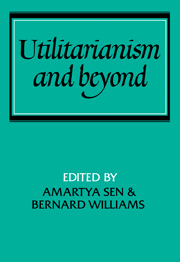Book contents
- Frontmatter
- Contents
- Preface
- Introduction: Utilitarianism and beyond
- 1 Ethical theory and utilitarianism
- 2 Morality and the theory of rational behaviour
- 3 The economic uses of utilitarianism
- 4 Utilitarianism, uncertainty and information
- 5 Contractualism and utilitarianism
- 6 The diversity of goods
- 7 Morality and convention
- 8 Social unity and primary goods
- 9 On some difficulties of the utilitarian economist
- 10 Utilitarianism, information and rights
- 11 Sour grapes – utilitarianism and the genesis of wants
- 12 Liberty and welfare
- 13 Under which descriptions?
- 14 What's the use of going to school?
- Bibliography
2 - Morality and the theory of rational behaviour
Published online by Cambridge University Press: 30 January 2010
- Frontmatter
- Contents
- Preface
- Introduction: Utilitarianism and beyond
- 1 Ethical theory and utilitarianism
- 2 Morality and the theory of rational behaviour
- 3 The economic uses of utilitarianism
- 4 Utilitarianism, uncertainty and information
- 5 Contractualism and utilitarianism
- 6 The diversity of goods
- 7 Morality and convention
- 8 Social unity and primary goods
- 9 On some difficulties of the utilitarian economist
- 10 Utilitarianism, information and rights
- 11 Sour grapes – utilitarianism and the genesis of wants
- 12 Liberty and welfare
- 13 Under which descriptions?
- 14 What's the use of going to school?
- Bibliography
Summary
Historical background
The ethical theory I am going to describe in this paper is based on three different time-honoured intellectual traditions in moral philosophy. It also makes essential use of a great intellectual accomplishment of much more recent origin, namely, the modern Bayesian theory of rational behaviour under risk and uncertainty.
One of the three moral traditions I am indebted to goes back to Adam Smith, who equated the moral point of view with that of an impartial but sympathetic spectator (or observer). In any social situation, each participant will tend to look at the various issues from his own self-centred, often emotionally biassed, and possibly quite one-sided, partisan point of view. In contrast, if anybody wants to assess the situation from a moral point of view in terms of some standard of justice and equity, this will essentially amount to looking at it from the standpoint of an impartial but humane and sympathetic observer. It may be interesting to note that modern psychological studies on the development of moral ideas in children have come up with a very similar model of moral value judgements.
Another intellectual tradition I have benefited from is Kant's. Kant claimed that moral rules can be distinguished from other behavioural rules by certain formal criteria and, in particular, by the criterion of universality (which may also be described as a criterion of reciprocity). For example, if I really believe that other people should repay me any money they have borrowed from me, then I must admit that I am under a similar moral obligation to repay any money I have borrowed from other persons under comparable circumstances.
Information
- Type
- Chapter
- Information
- Utilitarianism and Beyond , pp. 39 - 62Publisher: Cambridge University PressPrint publication year: 1982
Accessibility standard: Unknown
- 40
- Cited by
